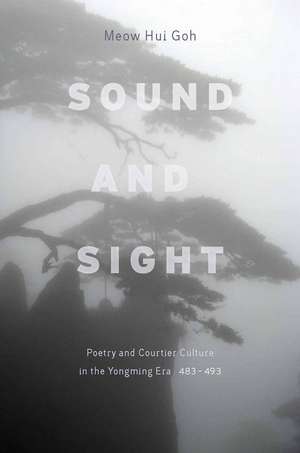Sound and Sight: Poetry and Courtier Culture in the Yongming Era (483-493)
Autor Meow Gohen Limba Engleză Hardback – 23 aug 2010
This is the first book to examine Chinese poetry and courtier culture using the concept of shengse—sound and sight—which connotes "sensual pleasure." Under the moral and political imperative to avoid or even eliminate representations of sense perception, premodern Chinese commentators treated overt displays of artistry with great suspicion, and their influence is still alive in modern and contemporary constructions of literary and cultural history.
The Yongming poets, who openly extolled "sound and rhymes," have been deemed the main instigators of a poetic trend toward the sensual. Situating them within the court milieu of their day, Meow Hui Goh asks a simple question: What did shengse mean to the Yongming poets? By unraveling the aural and visual experiences encapsulated in their poems, she argues that their pursuit of "sound and sight" reveals a complex confluence of Buddhist influence, Confucian value, and new sociopolitical conditions. Her study challenges the old perception of the Yongming poets and the common practice of reading classical Chinese poems for semantic meaning only.
The Yongming poets, who openly extolled "sound and rhymes," have been deemed the main instigators of a poetic trend toward the sensual. Situating them within the court milieu of their day, Meow Hui Goh asks a simple question: What did shengse mean to the Yongming poets? By unraveling the aural and visual experiences encapsulated in their poems, she argues that their pursuit of "sound and sight" reveals a complex confluence of Buddhist influence, Confucian value, and new sociopolitical conditions. Her study challenges the old perception of the Yongming poets and the common practice of reading classical Chinese poems for semantic meaning only.
Preț: 479.77 lei
Nou
Puncte Express: 720
Preț estimativ în valută:
91.81€ • 98.17$ • 76.54£
91.81€ • 98.17$ • 76.54£
Carte tipărită la comandă
Livrare economică 17 aprilie-01 mai
Preluare comenzi: 021 569.72.76
Specificații
ISBN-13: 9780804768597
ISBN-10: 0804768595
Pagini: 208
Dimensiuni: 152 x 229 x 20 mm
Greutate: 0.45 kg
Editura: Stanford University Press
Colecția Stanford University Press
ISBN-10: 0804768595
Pagini: 208
Dimensiuni: 152 x 229 x 20 mm
Greutate: 0.45 kg
Editura: Stanford University Press
Colecția Stanford University Press
Recenzii
"[A] highly readable study if Yongming poetry that explores its new modes, devices, and themes in a compelling way."—Nicholas Morrow Williams, China Review International
"It is to the author's credit that in the short pages of the main body of the book, she presents a precise and clear picture of how the Yongming poets distinguished themselves and their poetry . . The author serves as a perceptive, reliable, and oftentimes inspiring guide leading us through the multifarious and emotionally charged landscape as it unfolds visually and acoustically before her poet protagonists . . . [H]eroic and laudable . . . [A] fresh and important contribution to our knowledge and understanding of this pivotal period in Chinese literary and cultural history. This carefully researched and finely written book provides a solid basis for further studies in the future."—Yugen Wang, Chinese Literature: Essays, Articles, Reviews
"The author's persuasively argued case—that the new poetics of Yongming-era court poetry was founded on, and in practice subtly guided by, Buddhist principles—takes up roughly the first three chapters of Sound and Sight. In the remaining three chapters, she extends her study into the world outside the court, as her poets encountered it in their poetic excursions . . . We have therefore all the more reason to wish to learn from these remarkable poets, and—in the same way that they helped their contemporaries to see and hear the world anew—perhaps we can, with the help of Meow Hui Goh's interpretations, see and hear them again as if for the first time."—Alice W. Cheang, Journal of Chinese Studies
"Sound and Sight helps us to understand a pivotal period in Chinese poetry and its characteristic style. The formal innovations of the Yongming era, bearing particularly on sound patterns, are a forest of fearsomely technical issues ordinarily left to specialists. As this book demonstrates, "sound" is not just a physical phenomenon, but a mode of perception. Perception in all its modes was a matter of intense interest for the Yongming poets, an area in which their receptivity to Buddhist teaching met their attention to verbal craft; and it is through her attention to the modes of perception made active in the poetry that Meow Hui Goh links literary style with intellectual history."—Haun Saussy, Yale University
"Goh's solidly researched effort to understand the Yongming era through its own aesthetic ideals not only takes a comprehensive approach to the much debated euphonic guidelines, but examines a change in the poet's sense of self-worth and situates major themes in the context of the court's environment and culture."—Cynthia L. Chennault, Editor, Early Medieval China
Notă biografică
Meow Hui Goh, Assistant Professor at the Ohio State University, specializes in medieval Chinese poetry, poetics, and literary culture.
Descriere
As the first book-length study of the Yongming poets, this book focuses on unraveling the complexity and hybridity of the poetic voices beneath their seemingly "technical" pursuit of prosodic innovation.
